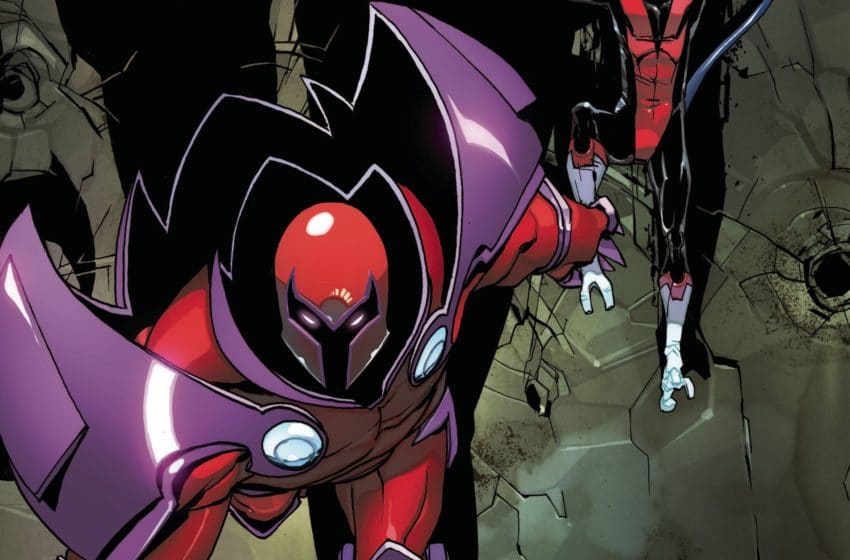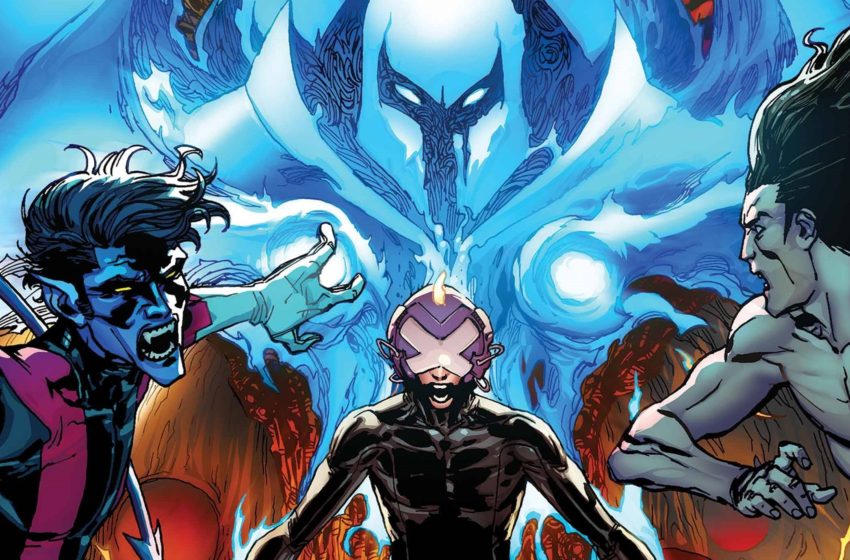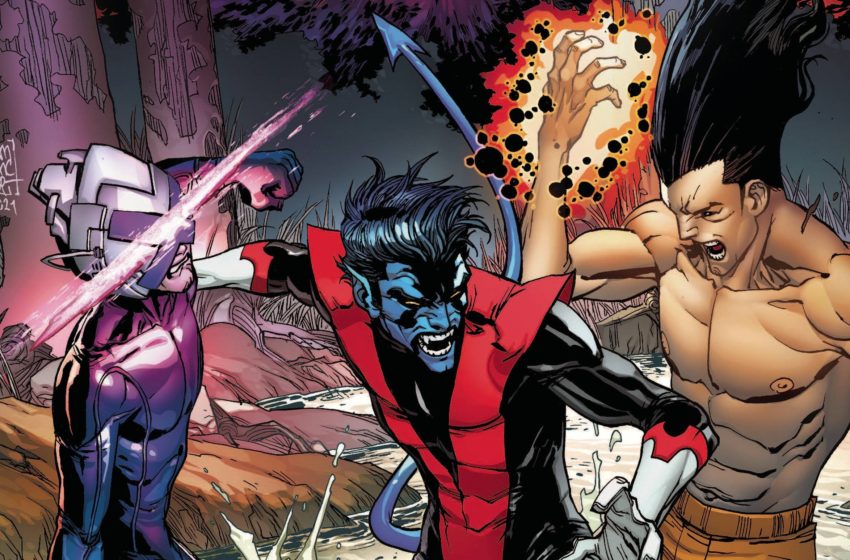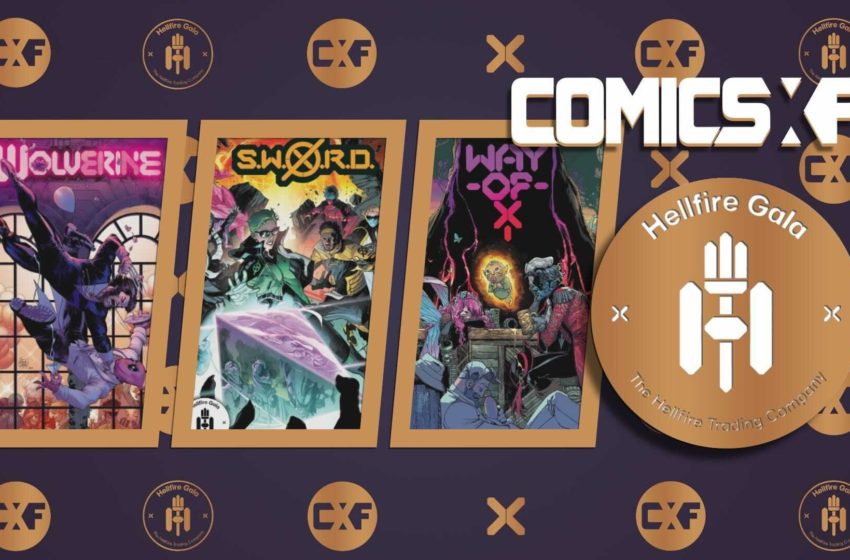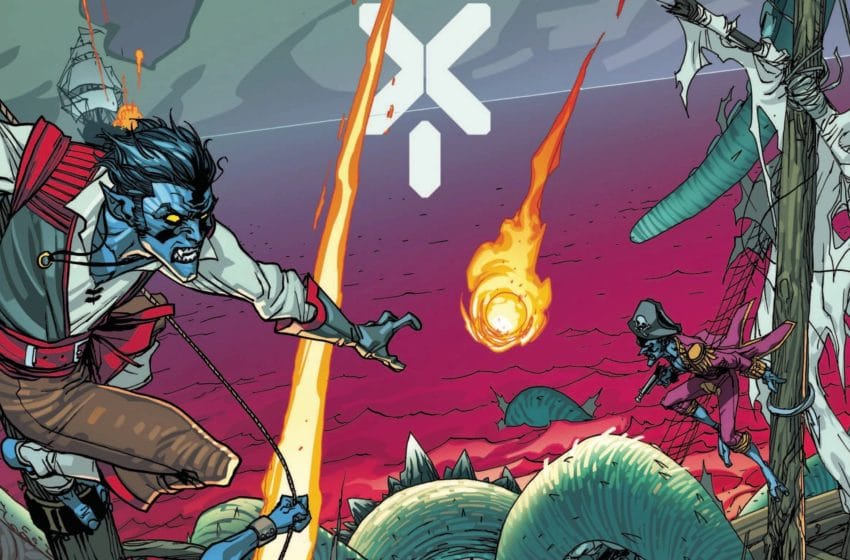The Third Law of Krakoa. “Respect this sacred land.” It should be known to all, but they still had to make it a law. Si Spurrier, Bob Quinn, Java Tartagila and Clayton Cowles examine it in Way Of X #5.
Jude: I do not like this comic, not because it’s a bad comic, because objectively it’s not bad, but because subjectively I have no joy when I read this comic.
Comic books allow me a way of seeing the world that, at their best, provide unique, eye opening revelations, and at the least are nominally entertaining. Way of X, to me, fails miserably in the former category and just barely, barely passes muster on the latter.
And I suspect I’m the one of us that likes this comic the most.
I’m sure there are those who enjoy this comic, people who don’t see all of the gaps of logic and reason and taste, and think this is just an all too good escape. That’s fine. People can disagree. I’m also sure someone is reading this, getting ready to fire off tweets about us being too woke or some bullshit, and since I know what people mean by woke, I’ll own it. That’s also fine.
But I stand by my assessment. This whole book has been disappointing when it’s not been offensive and oblivious to precedent. It’s a shame. It’s sad. But, at least for me, it’s not really a surprise.
Anna: I’m with you, Jude. This issue could mostly work for me on its own, but months of trying to puzzle through what this series is trying to say has taken a lot out of me. I might enjoy this series more if I was less familiar with Nightcrawler and less suspicious of the politics of representation in this space. Yet since this is a comic about Nightcrawler that often discusses societal power structures – maybe I shouldn’t have to ignore those investments to enjoy this series?
Anyway, a lot happened in this issue – I’ll give it that. This includes some very important revelations regarding Onslaught and the resurrection protocols, plus the dramatic near-destruction of Mars – now, of course, known as Arakko. This issue also features Kurt making a lot of statements about morality and bodily consent that read certain ways depending on how you reacted to his actions in previous issues. But we’ll get to that. First: a scene at a hatchery.
Family Matters

Jude: We meet Charles, post resurrection, as he’s brought up to date on everything by Emma [Ed. note: you’d think Chuck would be resurrected first, then everyone else, right?] Apparently the kids are acting a little strange, as foreboding red eyes and a desire to have a “cruciball” indicate. And who was responsible for all of this?
Legion, of course (But not really. Of course.)
Charles then travels to Mars, err, Arakko, to talk to his wayward son. Except his son isn’t listening. Legion is building… something, and X/Zorn(s) [Ed. note: love that level of confusion] won’t let the professor get close. Xavier wants Legion to stay where he is, and not return to Krakoa.
Action is split between Mars and Earth, where Kurt is trying to broker peace between Lost and Fabian, but we’ll focus on that (shit)show later.
Anna: As usual, the Legion and Xavier scenes were my favorite part of the issue. I think Xavier is occasionally a bit too obviously evil in this series, but since he’s presumably Onslaught-ed all to heck, I’ll allow it. When we’re in the Legion scenes, I feel like I know what the series is doing; it’s about fatherly neglect and unreasonable expectations that extend to a whole nation built by that father, and the things both the father and the nation have to answer for in terms of the the types of difference or “disruption” they’re willing to allow. Mass murderers and rapists? Fine. People like Legion or the absent precogs who might disrupt the nation’s power structures? Less fine. The fact Legion is specifically being exiled because he’s “unstable” is particularly harsh and heartbreaking. This new nation apparently can’t accommodate neurodiversity. Or maybe this is specific to Xavier and Legion? It could go either way, as written.
Jude: I mean this is just par for the course, right? This is who Xavier is – a massive, unrepentant, unthinking, arrogant asshole. For all I complain about in this book, this depiction of Charles is one I appreciate most. He’s wholly unlikeable and incompetent which; to be fairly he always has been. I’m just glad it’s made explicit here.
I didn’t expect Legion to be the sane one here, but maybe I should have. This is clearly his book. He’s the sympathetic character. He’s the rational character. He’s the one who’s made the hard and always correct decisions without hesitation.
If I was picking up this book with no context of who Legion was, I’d have no idea of how complex and complicated a character (or, more accurately, characters) he is. So many of his idiosyncrasies feel underplayed and underdeveloped. That’s really my issue. In order to make him the focus character, it feels like Spurrier stripped him of all that made him special. I don’t particularly like that. I don’t think it respects the character (or people who suffer from similar conditions as that character.) [Ed. note: It may also be that Spurrier spent 24 issue of X-Men: Legacy focused on Legion that did respect the character and grew him into this. Your mileage may vary if you haven’t read that series]
Anyway, I’m rambling. Point is Legion has everything figured out correctly and quickly. Kurt, on the other hand, should be so lucky.
Anna: I’ve been giving Spurrier benefit of the doubt with this version of Legion because of the groundwork he previously laid with the character, but I agree it’s been a very singular, direct voice in this series – a lot like an author surrogate. I’ve been assuming this singular voice won’t last, but no predictions.
In any case, we should mention perhaps the most important bit of dialogue in the Xavier and Legion scene, which involves an acknowledgement of the deeply problematic Mercury and Loa scene from WoX #3. Addressing Nightcrawler, Legion says/thinks, “Ooh, poor Mercury and Loa – did you hear about that? Someone like me meddlin’ in two lasses’ private business – no wonder it all went to hell.” Was this added in response to criticism? I’m not sure. But it certainly sounds like it.
Unfortunately, though, Loa and Mercury’s suffering is still being used to serve the emotional growth of male characters; the women who suffered are talked about rather than heard from. Of course, the bulk of this issue was probably written and drawn by the time WoX #3 came out, meaning acknowledgement of the misstep was likely the most we could hope for. Yet this isn’t a one-off problem. Female characters suffering or being sidelined for the sake of male character development has happened a lot in this series, with Lost, with Stacy X and the women working at the nursery, and implicitly with the many mutants – whose identities we don’t know since they were completely off-panel – who carried to term babies they didn’t want or couldn’t care for, party so Kurt could learn a lesson he shouldn’t need to learn.
Anyway – for now, I’ll try to be optimistic and hope this acknowledgement leads to more and better fixes in the future. Anything’s possible, right?
Legion also offers an important revelation: Onslaught is feasting off the “bits of lost life” that are shed each time someone gets resurrected. Presumably, we’ll be coming back to this. For the moment – it introduces a significant consequence to dying in this deathless utopia/dystopia.
Step-by-Step

Anna: As we predicted last month – that attempt at restorative justice with Lost and Fabian Cortez did not go well. As Xavier talks to Legion and Legion talks (psychically) to Nightcrawler, Lost and Cortez are trying to kill each other, and it’s all Kurt can do to stop them. Lost says she doesn’t care if they kill each other, since “dying doesn’t matter.” Kurt protests that “it has to. Or neither does living.”
As Lost and Coztez continue fighting, Legion pleads with Kurt to “help [him] be better than [Xavier],” repeating a line we’ve heard before, about Kurt being “one of the kindly ones.” Kurt gets increasingly frustrated, until he declares he’s had enough, and teleports Lost and Cortez into the sky, 10 kilometers above the planet’s surface [Ed. note: that’s 6.2 miles for American friends]. Lost’s gravity powers can save her and Cortez, but only if Cortez allows her to use them; if he doesn’t, they’ll both die, with Kurt promising Cortez he’ll go to the back of the resurrection queue. Lost and Cortez have to work together to save each other, and I guess keep talking through their grievances? It’s not really clear what makes the talking necessary, but that’s what the scene proposes.
For a while, it seems to work. Then, the shadow of Onslaught appears. Cortez brutally attacks Lost, killing her. But as he kills her, he boosts her gravity powers, which throws a moon out of orbit, sending it falling toward Arakko, where it promises to kill a whole lot of people.
I have thoughts on Lost being brutally killed and then literally tossed aside so that Cortez can feel things… How did you handle this scene, Jude?
Jude: So I’m going to start here by sharing, verbatim, thoughts from our Slack:
“He (Spurrier) created a Black character (Lost), striped her or any agency, imbued her with a history of suffering by using racist tropes, for the express purpose of allowing a white man, the most repugnant white man of all white men on Krakoa (Fabian Fucking Cortez) which is saying something, a shot at redemption. Lol.”
So yeah, I hate this. And I don’t really have anything to add. Yes, it was cool seeing how the restorative justice completely, predictably failed. And maybe Kurt deciding to drop everyone from the sky was an, uh, inspired way of trying to get everyone on the same page. And sure, skipping a little bit ahead, seeing Kurt move a moon was legitimately cool.
But.
The coolness of the moment was cooled by the conduit of Kurt’s kicked-up power. Fabian has been nothing but horrible in every comic he’s been in. That is who he is. And as one who believes in redemption, I am not opposed to him having a redemptive, heroic moment. But this felt… unearned. Out of character. His bearing of a soul (albeit in one panel) did not resonate with me; it offended me. Even if he wasn’t totally responsible for killing Lost, it feels like her death was simply a means to an end. Cortez, ever the antagonist, gets sympathy. Lost gets Lost.
Such is the world I suppose. Such is the world.
Anna: The choice to center Cortez in this scene feels strange even if you don’t read it as offensive. I get that Cortez and his ilk need dealing with, because they’re a significant practical and moral problem on Krakoa. But I don’t understand why this has to happen at the expense of Lost. Again.
Still, I liked parts of this scene. I’m certainly on Legion’s wavelength when he psychically yells at Kurt to, “Stop bloody thinking and start bloody acting!” I also think Kurt’s anger and frustration were convincing. Is Kurt “right” in this scene? Obviously not – bringing Lost and Cortez together was a terrible idea to begin with, and while Kurt couldn’t have predicted the intrusion of Onslaught, his tactics are still ultimately responsible for the near-destruction of Arakko, and the millions of deaths it would have caused. I don’t stan Kurt being perfect; I stan him being believably characterized. Here he was trying to do what he thought was a good thing, and it backfired into a very bad thing. It happens.
And yet, I do have mixed feelings about some of the thematic points of emphasis, including Kurt telling Lost and Cortez, with a dramatically raised finger and a demonic snarl, “And I. Will. Judge you.” This should be shocking – Kurt is well-known for never judging anyone, ever. And seeing him unleash his demonic side can be unsettling in good ways, reminding us what he’s capable of if he didn’t work hard at being the super-good person he is. Yet this version of Kurt hasn’t shown much hesitancy about dolling out judgement, as his unpleasant interaction with Stacy X in WoX #3 proves. Am I meant to read Kurt as a mostly-good person caught in a bad moment, or someone descending into fundamentalist fury? In part because of his uneven characterization – I’m really not sure.
Kurt’s discussion of bodily consent in this scene also hit me a certain way, again because of the earlier interaction with Stacy. To be blunt – I’m not really up for this version of Kurt lecturing me on this particular topic at this particular moment, not until I know for sure what’s going on with “Make More Mutants” and reproductive rights.
Boy Meets World

Anna: The moon is falling, and there isn’t time to get everyone off Arakko – millions will die if somebody can’t do something. So, Kurt does something; he makes Cortez boost his powers so he can teleport the moon back into orbit. It’s a cool concept, and visually, it’s very cool; props to Bob Quinn. As the moon teleportation thing is happening, Kurt has a revelation; he’s seen the way to save Krakoa, but knows he won’t remember it. He’s relying on Cortez to remind him, but Cortez ends the issue in a vegatative state, and no one’s anxious to wake him up. Kurt, meanwhile, fully dies on the moon, and gets resurrected in the comic’s concluding scene.
Jude: In the end, our resurrected Hero (it must really be traumatic saving the world before he dies in ways that so incredibly tax his body) awakens, shaken that he might have committed suicide which, umm, makes no sense. He clearly remembers what he did and why he did it; he has a history of doing this before. Why would he even bring this up? It’s a silly misreading of the character that…you know what, let me stop. I’m not the expert. You are. *tags you in*
Anna: I’m sure I sound like a broken record griping about the characterization of Kurt in this series, but I can’t help it – as a longtime fan of this character, the ways this series has consistently ignored Kurt’s established history for the sake of telling the story it wants to tell continues to bother me.
Kurt expressing concern about the morality of giving his life to save Arakko is the latest example. I realize I’m meant to understand Kurt is concerned because he’s Catholic. This is already strange, because surely this is martyrdom, rather than suicide? Or, you know, just regular dying? But it’s additionally strange because Kurt has performed dangerous teleports where he knew he might die many, many times. Most memorably: it’s how he died in “Second Coming,” after which he went to actual heaven, meaning he knows, with absolute certainty, that there’s nothing wrong with this as far as his God is concerned. I’m not asking for every little piece of continuity to count. But I’m talking about major moments in X-Men history here. Kurt reacting like this to his resurrection makes him look dumb on multiple levels; he doesn’t understand his own actions, remember his own past, or even understand his own faith.
Jude: So now Onslaught is in all resurrected mutants, like a virus. Or maybe like an evil spirit, a literal devil on your shoulder. I should probably care more, but I don’t for some reason. I feel like the solution to this problem will be as unsatisfying as the rest of the read. Which is a shame. There are some good bones here; some really intriguing ideas and some of the most complex characters in the comic line. Yet to see these complexities flattened out or misrepresented, to see great ideas mishandled if not outright ignored. It’s frustrating.
And I get it. It’s just a comic. Just take it at face value. Why so serious? Because I’ve seen better, read better, experienced better. I have the right to expect better. And this was not better. This was not really good. This just was.
Maybe that’s good enough for some. It’s not good enough for me.
Anna: Since this is the last regular issue of this series before the Onslaught: Revelations one-shot in September, allow me to offer a few reflections of my own on where we’ve been, and where we might go from here.
This series’ missteps have made me think a lot about the hopes so many of us have pinned on Krakoa and how often the franchise has fallen short of those hopes, in ways that perhaps make us look foolish for hoping, but also reveal mainstream comics’ continued prejudices and blind spots, which surface even when they’re supposedly trying to do better – sometimes, specifically because they’re trying to do better, but don’t quite seem to know how. That could be a metaphor for the journey of this series’ main characters, and maybe it is. But men with no moral authority making decisions for everyone else is both the thing this series criticizes and the thing it does. Maybe future stories can do better.
The questions WoX #3 raised about reproductive rights would be a good place to start. As you’ll recall – Kurt cited “Make More Mutants,” a law he created that is a central tenet of Krakoa, as the reason he was opposed to Stacy X handing out contraception. Until that moment, I never would have thought to doubt the legality of contraception on Krakoa. Because I care quite a bit about this issue, and because it deeply affects our understanding of Kurt as a character and this world as a whole – I’m really hoping this gets redressed at some point, by someone.
To end on something positive – writing with Jude has absolutely been the best part of reading this comic every month. I’m very grateful for that part of this journey.
Jude: I am honestly, truly thankful for writing with you. Your observations are well thought out and spot on. Your clarity and passion are always appreciated. You’ve made me a better thinker.
So maybe something good came from this after all.
X-Traneous Thoughts

- In interviews, Spurrier continues to describe Kurt as an ordained Catholic priest. Everyone handles continuity storytelling differently. But major rewrites of a lead character’s backstory should probably happen on-panel, rather than solely in the mind of the writer.
- Lost calling Kurt “Mr. Wagner” is one of those things that may very well not be racist but feels very damn racist.
- And here I was just feeling thankful she didn’t call him “Father Wagner”…
- I haven’t talked about Art much here, but I must say I loved the panels depicting the movement of the moon. That was legitimately dope to see.
- Abigail Brand is quickly becoming my favorite person.
- I (Anna) want to make some kind of sassy joke about this being the second comic in a row that’s ended with Kurt being covered in goo, but I can’t muster the energy. This series has significantly diminished my passion for the topic of sexy Nightcrawler. And Nightcrawler in general.
- Krakoan Reads: ONSLAUGHT REVELATION

